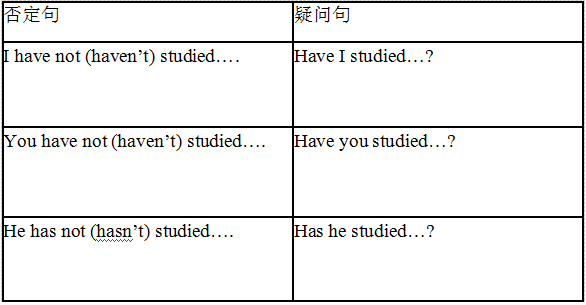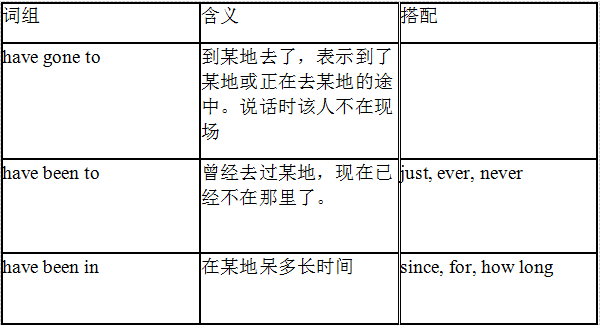
第四十九讲
Present Perfect (现在完成时态)
现在完成时态表示行为或状态在过去已经发生或存在,但其产生的后果或造成的影响至今依然存在。
We’ve known each other for about two years.
His mother has been ill since last month.
Have you returned the book?
The little girl has been to Japan twice.
现在完成时态与非延续性动词:
I have come her for two days.
I cam here two days ago.
现在完成时态常用的时间副词状语。
A. 表示频率的副词和just副词放在主要动词的前边。
Mr. Rose has just (/often/ never/already/) been to the beach.
B. still, never, ever这些副词与现在完成式连用时,still通常放在have或has之前,而 never和ever放在 have或 has之后。
He still hasn’t used his money in the bank.
This is the most exciting film I have ever seen.
C. already和 yet与现在完成连用时already通常用于肯定句中; yet通常用语否定句子和疑问句子中, already 经常放在has和 have之后,而yet常放在句末
He has already sailed around the world twice so far.
He hasn’t had a serious accident yet.
D since和for 也经常与现在完成连用。指一段时间的开始用since;指一段时间,用for.
He has been away. Since July 2./Since last March.
He has been in Europe. For ten days./For a long time.
现在完成时
PRESENT PERFECT TENSE
It is used to show actions which started in the past and are still continuing, or actions which happened in the past, but have an effect till the present.
冬天来了,春天还会远吗?If winter has already come, can spring be far behind?
1.现在完成时的概念
1)表示过去发生或已完成的动作对现在造成的影响或结果;
I have had dinner already.(I’m full now)
2) 表示过去已经开始并一直持续到现在的动作或状态。
eg: He has learned English since 2001.
2.现在完成时的结构
现在完成时的构成:
主语+ have/has +过去分词+宾语+状语
Have:第一、二/ 复数
Has: 第三人称单数
规则动词:
(1)一般动词,在词尾直接加“ ed ”。
work---worked---worked ,visit---visited---visited
(2)以“ e ”结尾的动词,只在词尾加“ d ”。
live---lived---lived
(3)以“辅音字母 + y ”结尾的动词,将 "y" 变为 "i" ,再加“ ed ”。
study---studied---studied ,cry---cried---cried
(4)重读闭音节结尾,末尾只有一个辅音字母,先双写该辅音字母,再加“ ed ”。
stop---stopped---stopped , drop---dropped--dropped
重点1:写出下列动词的过去式和过去分词
work ______ ______
live ______ ______
stay ______ ______
stop ______ ______
clean ______ ______
study ______ ______
key: worked worked
lived lived
stayed stayed
stopped stopped
cleaned cleaned
studied studied
不规则动词
AAA型 cost cost cost ;cut cut cut
AAB型 beat beat beaten
ABA型 ①run ran run;
②come came come
③become became become
ABB型 buy bought bought;
build built built
ABC型 begin began begun;
choose chose chosen
3.现在完成时的否定与疑问
现在完成时的否定式直接在助动词have或has后面加上not、疑问式是把助动词提到主语之前。

例题Rewrite the sentences.
1. I have been to Shanghai before. (改为否定句)
I _________ _________ been to Shanghai before.
2. He hasn’t come to school because he was ill. (就划线部分提问)
______ ______ he come to school?
Key: 1. Have not
2. Why hasn’t
重点2:现在完成时态的否定与疑问
比较have been to/in和have gone to
He has gone to Shanghai.他(已经)去上海了。
He has been to Shanghai.他(曾经) 去过上海。
have(has) been in表示“在某地呆多长时间”,常与表示一段时间的状语连用,如:since, for, how long 等。例如:
Mr. Brown has been in Shanghai for three days. 布朗先生来上海已经有三天了。
小结

重点3 have been to/in和have gone to 的对比例题
1. Jane has _____ to BeiJing. She will come back tomorrow.
A. been B. never been
C. went D. gone
2. Hello, this is Mr. Green speaking. Can I speak to Mr. Black?
-- Sorry. He ______ the Bainiao Park.
A. has been to B. has gone to
C. went to D. will go to
3. --____ you ever ____ to the US?
-- Yes, twice.
A. Have, gone B. Have, been
C, Do, go D. were, going
Key: BBD
4.现在完成时的用法
1)现在完成时通常表示在说话之前已经完成的动作或存在的状态。说话人强调的是该动作或状态对现在的结果或影响。
(汉语中常用“已经”、“过”、“了”等表达)通常与表示包括现在在内的时间副词 just,already, before, yet, never, ever ,two times等状语连用。例如:
My daughter has just gone out. 我女儿刚出去。
I’m sure we’ve met before. 我肯定我们以前见过面。
Have you milked the cow yet?牛奶的奶挤了吗?
I have never heard that before.我从没听说过。
2)表示持续到现在的动作或状态,往往和包括现在在内的表示一段时间的状语连用,如recently, lately, for…, since…, 等。如:
We haven’t seen you recently. 最近我们没有见到你。
They have been away for two years. 他们离开已经两年了。
She has been with us since Monday. 她从周一开始就跟我们在一起了。
注意:1) since和for的区别
since后接时间点,如1993,last term, yesterday, the time I got there,Tuesday, October--------“自从”……
for后接一段时间,表示“长达多久”,如ten years, a while, two days等。-----“长达”……
重点4:since和for的区别
1. Jim has been in Ireland ______ Monday.
2. Jill has been in Ireland ______ three days.
3. His aunt has lived in Australia ______15 days.
4. Mary is in her office. She has been there ______ 7 o'clock.
5. India has been an independent country ______1974.
6. The bus is late. They've been waiting ______ 20 minutes.
7. Nobody lives in those houses. They have been empty ______ many years.
8. Mike has been ill ______a long time. He has been in hospital ______ October.
Key: since
since
since
since
for
for
for
for
for
注意:2)表示短暂意义的动词如arrive, leave, borrow, buy, begin, start, die等,在完成时当中不能和表示一段时间的状语连用(不能和since, for, how long 连用)。
短暂性动词
He has come here for 2 years. F
The old man has died for 4 months. F
They have left only for 5 minutes. F
以上三句话可以改为:
He has been here for 2years.
The old man has ______ _______ for 4 months.
They have _____ _____ only for 5 minutes
Key: 1.been dead 2. been out
1. I borrowed the book two days ago.
2. The meeting started ten minutes ago.
3. He joined the League two years ago.
4. My old friend died yesterday.
5. He left his hometown last year.
6. I have kept the book for two days.
come borrow leave go join die become buy
begin get to know fall asleep… (非持续性动词)
注意:3)现在完成时不能和表示过去的时间状语连用,如yesterday, last year, in 1976, two days ago, just now
(F)Tom has written a letter to his parents last night.
(T)Tom wrote a letter to his parents last night.
5.现在完成时与一般过去时的比较
1)一般过去时表示过去某时发生的动作或单纯叙述过去的事情,强调动作;
现在完成时为过去发生的,强调过去的事情对现在的影响,强调影响。
I saw this film yesterday.
I have seen this film.
2)一般过去时 常与具体的表示过去的时间状语连用;
现在完成时通常与模糊的时间状语连用,或无时间状语。
一般过去时的时间状语: yesterday, last week,…ago, in1990, in October, just now, …-- 具体的时间状语
现在完成时的时间状语: for, since, so far, ever, never, just, yet, till/until, up to now, in the past few years, recently, … --模糊的时间状语
3)现在完成时可表示持续到现在的动作或状态,动词一般是延续性的,如live, teach, learn, work, study, know.
一般过去时常用的非持续性动词有come, go, leave, start, die, finish, become,get married等。
She joined the League three years ago. (加入的动作不是延续的)
She has been in the League for three years (since three years ago).
(在团内的状态可延续)
She has been a League member for three years (since three years ago).
(是团员的状态可持续)